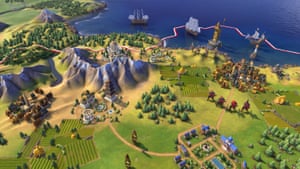One billion hours, veteran game designer Sid Meier notes in this light and enjoyable memoir, is an unfathomable length of time. And yet it took just six years for players to spend a billion cumulative hours on the fifth iteration of Meier’s engrossing Civilization series, a nation-building game that has seen them shepherding their peoples from the foundation of their first city in 4000BC to an eventual victory through military, cultural or scientific might, millions of times over.
What makes the Civilzation games so compelling? The fans are a cut above; I’d know as I am one of them, having racked up 530 hours on Civilization VI since I bought it at the beginning of lockdown. For Meier, good game design comes down, at its core, to a series of “interesting decisions”. Give players too few choices and you aren’t really making a game, you’re making interactive fiction; give them too much, and the panoply of options renders the whole thing more stressful than entertaining.
That same approach could be said to have guided Meier’s life. An unusual figure in the field, Meier gained a reputation as an auteur in an era when the names of individual developers were rarely known to the players of their games, and occasionally went uncredited entirely. Meier, by contrast, is quite literally a brand: his name has been at the top of his games from 1987’s Pirates! onwards.
But as well known as his name may be, few know much about the man himself. Barring a few well-trodden anecdotes, such as founding his company on the back of a bet made in Las Vegas, Meier has preferred to focus on his games rather than himself. Where Sid Meier’s Memoir does reveal personal details, such as a childhood relocation to his father’s native Switzerland while his younger sister was dying of Hodgkin’s lymphoma, or how the first Civilization game came just two weeks before the birth of his first son, he is quick to dismiss links between his work and his life. “I’m often asked in interviews when I got interested in games,” he writes. “From my perspective, there was no turning point … because as far as I can tell gaming already is the default, straightforward path.”
The focus on the games first, and man second, is embedded in the very structure of this memoir, with each chapter opening with a list of the games discussed within. While some chapters do broaden the focus, it’s clear where he thinks the most interesting stories lie. In his telling, the sum of the influence of his childhood lies in a minor fascination with Swiss railways and a single picture book of the US civil war; his first wife merits less discussion than JS Bach.
For him, the story really starts in 1982 when a young Meier bonded with a colleague over an arcade game on a work trip to Vegas. Meier insisted he could make a better one himself, and so a game, Hellcat Ace, and later a company, Microprose, was born.
His rise to auteur status was almost accidental. The first game to bear Meier’s name was less a vote of confidence than the opposite, a way to insulate sales of the company’s profitable flight simulators from the expected failure of a quirky piratical passion project. But Sid Meier’s Pirates! was eventually followed by Sid Meier’s Civilization, and the branding bought him creative freedom. Meier knew he was on to something when the second person to ever play Civilization, his younger brother, was given a prototype to offer feedback on.
“Bruce started playing, commenting helpfully,” Meier writes, “until at some point I got called away to the living room. Eventually, someone asked where he was. ‘I think he’s still in the back, playing Civilization.’ I glanced at my watch. Six hours had gone by.”

With a career as long as Meier’s, the book serves as a pocket history of game development itself, as team sizes grow and technology improves. But those looking to learn from the master, rather than about him, may be disappointed. Meier is more interested in sharing anecdotes from behind the scenes than assessing the works themselves. The result is a book that – perhaps appropriately given his mantra, “find the fun” – is an enjoyable read, but an unserious one. Whether it was Meier’s decision, or his publishers, to smatter the book with “achievements”, such as “read the word ‘the’ 1,000 times”, doesn’t help matters.
Such a breezy book waves away serious conversations and, one billion hours or not, Meier has little time for those who worry about video game addiction. “Just as this generation has fretted over the perils of gaming, the generation that grew up with the occasional county fair for entertainment considered books to be a genuine danger to their children,” he notes.
What he is far more interested in is why a title as potentially dry as Civilization attracts the same compulsive behaviour as more frenetic games such as first-person shooters. The answer, he decides, is the potentiality: the fact that “a huge portion of Civilization happens in this nebulous ‘after that’ realm, stacking potential paths on top of actual”. With Meier’s book ending just before the release of Civilization VI in 2016, we know four years on that its players have racked up another half-billion hours. What’s next to come is always just one more turn.
-
Sid Meier’s Memoir is published by WW Norton & Co. To order a copy, go to guardianbookshop.com.
